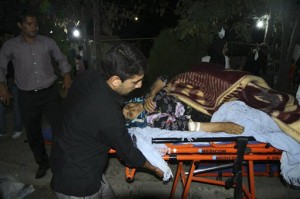
A man stretchers a woman who was injured in earthquake in the city of Ahar in northwestern Iran, on Saturday. A 6.2-magnitude earthquake hit the towns of Ahar, Haris and Varzaqan in East Azerbaijan province in northwestern Iran on Saturday, state TV said. (AP Photo/IRNA, Kazem Yousefi)
TEHRAN, Iran — Twin earthquakes in Iran have killed at least 250 people and injured over 2,000, Iranian state television said on Sunday, after thousands spent the night outdoors after their villages were leveled and homes damaged in the country’s northwest.
Images broadcast on the main news channel showed dozens of families sleeping on blankets laid out on the ground in parks. Some were crying, others shivering from chilly weather in the mountainous region hit by the quake, near neighboring Azerbaijan.
Over a thousand rescuers worked through the night to free people trapped under rubble and to reach some of the more remote villages affected. Television also showed people being evacuated on stretchers, while others underwent treatment for broken limbs and concussions on hospital beds.
By early afternoon on Sunday, state television was reporting that search operations had ceased. Hundreds of tents had been set up to house the homeless, it added.
The US Geological Survey reported that Saturday’s first quake at 4:53 p.m. (1223 GMT) had a magnitude of 6.4 and struck 37 miles (60 kilometers) northeast of the city of Tabriz at a depth of 9.9 kilometers (6.2 miles). State TV quoted local Crisis Committee chief Khalil Saei as saying the epicenter was a region between the towns of Ahar and Haris, about 200 miles (500 kilometers) northwest of the capital Tehran.
The second quake with a magnitude of 6.3 struck 11 minutes later, the U.S.G.S. reported. Its epicenter was 29 miles (48 kilometers) northeast of Tabriz at a depth of 6.1 miles (9.8 kilometers).
The quakes hit the towns of Ahar, Haris and Varzaqan in East Azerbaijan province, Iranian television reported. At least six villages were totally leveled, and 133 others sustained damage ranging from 50 to 80 percent, it said.
Some 36 aftershocks jolted the same area and were felt in a wide region near the Caspian Sea, causing panic among the population.
Iran is located on seismic fault lines and is prone to earthquakes. It experiences at least one earthquake every day on average, although the vast majority are so small they go unnoticed.
In 2003, some 26,000 people were killed by a magnitude 6.6 quake that flattened the historic southeastern city of Bam.